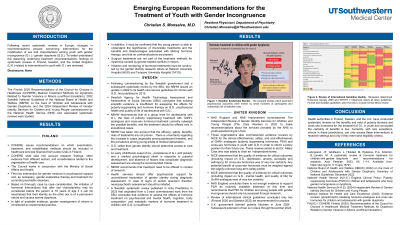Child and Adolescent Psychiatry
(042) Emerging European Recommendations for the Treatment of Youth with Gender Incongruence

- CM
Christian S. Monsalve, MD
Resident Physician
UT Southwestern Medical Center
Dallas, Texas - CM
Christian S. Monsalve, MD
Resident Physician
UT Southwestern Medical Center
Dallas, Texas
Presenting Author(s)
Background/Significance: Gender incongruence (G.I.) is characterized by a marked and persistent incongruence between an individual’s experienced gender and sex. Following recent systematic reviews in Europe, changes in recommendations ensued concerning interventions for the modification of sex trait characteristics in youth with gender incongruence, diverging from the World Professional Association for Transgender Health. It is important for physicians in the U.S.A. to be aware of these developments aboard as Psychiatry is often the first point of contact in the interdisciplinary care of patients experiencing G.I.
-
Objective: To better understand the reasoning underlying changes in treatment recommendations, findings of systematic reviews in Finland, Sweden, and the United Kingdom (U.K.) regarding interventions for youth with G.I. are reviewed.
-
Methods: The 2020 Recommendation of the Council for Choices in Healthcare (PALKO / COHERE Finland) Medical Treatment Methods for Dysphoria Related to Gender Variance in Minors (unofficial translation), 2022 Swedish National Guidelines of the National Board of Health and Welfare (NBHW) on the Care of Children and Adolescents with Gender Dysphoria, a systematic review by the State Preparation for Medical and Social Evaluation (SBU), the (U.K.) National Institute for Health and Care Excellence (NICE) systematic reviews on the use of gonadotropin releasing hormone (GnRH) analogues and cross-sex hormones, National Health Service (N.H.S.) England Clinical Policy: Puberty suppressing hormones (PSH) for children and adolescents who have gender incongruence / gender dysphoria were reviewed.
-
Results: Health authorities in Finland, Sweden, and the U.K. have conducted systematic reviews on the benefits and risks of puberty blockers and cross sex hormones for the treatment of G.I. in youth and concluded that the certainty of benefits is very low.
- Conclusions/Implications: Following systematic reviews, minors in Finland, Sweden, and the U.K., with rare exceptions, are recommended to only access these interventions in a research setting and only if they meet strict eligibility criteria. As a result, these recommendations diverge from that of several prominent medical associations in the U.S.A.
-
References:
2020 Recommendation of the Council for Choices in Healthcare (PALKO / COHERE Finland) Medical Treatment Methods for Dysphoria Related to Gender Variance in Minors (unofficial translation)
2022 Swedish National Guidelines of the National Board of Health and Welfare (NBHW) on the Care of Children and Adolescents with Gender Dysphoria, a systematic review by the State Preparation for Medical and Social Evaluation (SBU)
(U.K.) National Institute for Health and Care Excellence (NICE) systematic reviews on the use of gonadotropin releasing hormone (GnRH) analogues and cross-sex hormones
National Health Service (N.H.S.) England Clinical Policy: Puberty suppressing hormones (PSH) for children and adolescents who have gender incongruence / gender dysphoria
Presentation Eligibility: Not previously published or presented
Diversity, Equity, and Inclusion: The main author and presenter is a Hispanic bilingual trainee. Furthermore, the submission aims to highlight a growing body of European systematic reviews to improve the treatment of youth affected by gender dysphoria.

